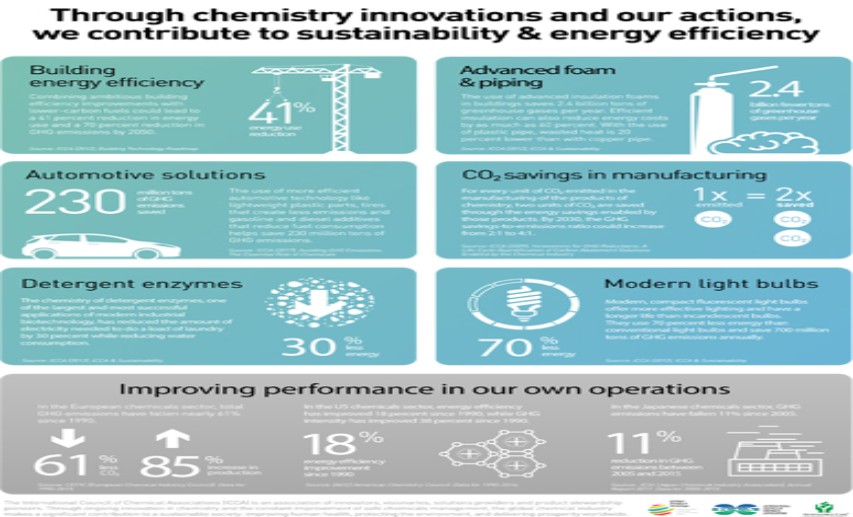01 October 2018 | Position
Downloads
-
ICCA Infographic: Contributions of the chemical industry to sustainability, climate protection and energy efficiency (PDF file)
PDF | 1 MB | Version as of: 01 October 2018 -
ICCA Infographic: Contributions of the chemical industry to sustainability, climate protection and energy efficiency (jpg fle in high resolution)
JPG | 2 MB | Version as of: 01 October 2018
In a "Climate Policy Satement", ICCA commits zu effective climate protection and presents recommendations which politicical instruments will promote the global implementation of climate protection in the best way, from the point of view of the international chemical industry.

Climate change is a global challenge that requires long-term commitment and action by every segment of society. A combination of technology, market-based and policy solutions will be necessary to reduce greenhouse gas emissions (GHG) and achieve climate goals, such as those of the Paris Agreement.
The chemical industry and innovations in chemistry are part of the climate change solution. As a significant manufacturing sector, we are continuously improving the energy efficiency and intensity of our own operations. And we are putting our brightest minds to work developing transformational technologies that cut emissions, improve energy efficiency and enable a socially, environmentally and economically sustainable future.
Chemistry is Essential to Overcoming Societal Challenges
The chemical industry creates revolutionary products and materials that are essential to meeting society’s needs of today and tomorrow. Through chemistry we enable adequate food supplies, clean water, medical advancements, comfortable living standards, and a healthy environment for a growing population.
Chemical technologies are directly fighting climate change as irreplaceable components of advanced building materials and batteries, renewable energy sources, electric and high-efficiency vehicles, and lightweight plastic packaging options that improve energy efficiency and reduce GHG emissions throughout our economy.
We are collaborating with our customers, public sector partners and other stakeholders to identify new and creative ways that chemistry can be further applied to addressing the needs of society and reducing GHG emissions up and down the supply chain.
We are committed to using the most resource-efficient, economically and technically viable feedstocks as our industry grows to meet increasing demand for the products, materials and innovations that a sustainable future requires and contribute to greater economic prosperity.
Principles for Reducing Worldwide GHG Emissions
Consistent, predictable policy and regulatory environments that foster innovation, investment and economic growth are essential to reducing GHG emissions while maintaining sustainability progress and minimizing costs to society.
We Support Effective Climate Policies That:
- Encourage global participation from all sectors of society
- Achieve net global GHG reductions and avoid shifting emissions between regions or countries – known as carbon leakage
- Include transparent monitoring, reporting and verification systems (MRV)
- Encourage the use of energy-efficient products and technologies
- Incorporate both mitigation and adaptation strategies
- Maintain energy affordability and do not distort markets
- Promote life-cycle considerations and science-based decisions
- Provide adequate flexibility to fit local, national or regional circumstances.
- Establish transparent, predictable, technology-neutral economic signals that will facilitate lower GHG emissions, such as price signals on GHG externalities like carbon emissions or incentives to support new technologies toward commercialization
- Acknowledge the role of carbon and bio-based feedstocks in creating essential products
- Encourage the integration of regional or national climate and energy policies
- Minimize complexity and administrative costs
Infographic

ICCA shows in a comprehensive chart, how the innovations and actions of the chemical industry worldwide contribute to sustainability, climate protection and energy efficiency. The graphic is availalble both as PDF file and jpg file in high resolution in the dowload section at the top of this page.
More information
Contact
For questions or suggestions, please feel free to contact us.

Dr. Tina Buchholz
Abteilungsleitung Energie, Klimaschutz und Kreislaufwirtschaft
- E-mail: buchholz@vci.de
